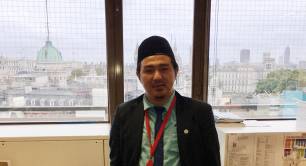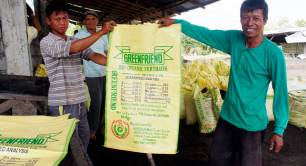Why Belfast offers a post-conflict social enterprise model for Mindanao
Earlier this year, a delegation from the Philippines visited Northern Ireland to find out more about how social enterprise can help heal fractured communities. This film shows what they learned.
In July 2017, government and civil society leaders from the Autonomous Region in Muslim Mindanao in the Philippines, an area which has seen decades of conflict and a quest for self-determination, visited Northern Ireland.
Their aim was to explore the role that social enterprises have played in supporting the peace process in Northern Ireland and bringing Protestant and Catholic communities together following the Good Friday Agreement.
The Filipino delegation came as part of a project co-funded by the EU called CSO-SEED which is designed to foster civil society participation in policy reforms that support decent work, job creation, and the development of social enterprises in Mindanao, one of the most deprived regions in the Philippines.
Ultimately, the project aims to promote inclusive economic development; foster solutions to chronic problems such as poverty, lack of access to potable water and poor education outcomes; and help deeply fractured communities heal. Creating jobs and opportunity, it is thought, will help remove incentives for young people to join criminal or rebel organisations.
The delegates met with a number of social enterprises in Northern Ireland, many of which are positioned on ‘interface areas’ which are areas of land between the Protestant and Catholic communities.
We see social enterprise as a great vehicle to try and pull people away from conflict
They visited the Resurgam Trust which promotes community based social enterprise in the city of Lisburn, outside Belfast, as a means of creating meaningful jobs and promoting regeneration in what once was one of Northern Ireland's most troubled and deprived estates.
Vince Curry of the Resurgam Trust said: “We see social enterprise as a great vehicle to try and pull people away from conflict.”
They also met with Mugshots, a social enterprise which helps young offenders in Hydebank Wood College, a youth offending institute, to gain the skills, support networks, and attitude to break the cycle of re-offending and compete more effectively for employment or start their own micro enterprise.
Gerry Ford, the director of Mugshots, told the delegates that “social enterprise has a huge role to play in the alleviation of poverty and areas of conflict. We have seen this first hand.”
Additionally, they met with the All Party Group on Social Enterprise in the Northern Ireland Assembly to understand the policy support that government in Northern Ireland has provided to foster the growth of social enterprise and how this learning can be relevant for the Philippines.
This film chronicles that visit and illustrates how the UK’s experience in social enterprise can inform and support its growth in other countries. It shows how much value there is in sharing experience in social enterprise. And it exemplifies the role that social enterprise can play in a post-conflict environment.
Referring to a milestone in the peace process in Northern Ireland, Angel Flores of the British Council Philippines, said: “I think the most important take away [from the visit] was to actually hear from key players within the sector how social enterprises have contributed to building community cohesion after the Good Friday Agreement was signed.”
Click here for more about the British Council's CSO-SEED programme with the EU in the Philippines. Read the British Council's survey ‘The state of social enterprise in the Philippines.



